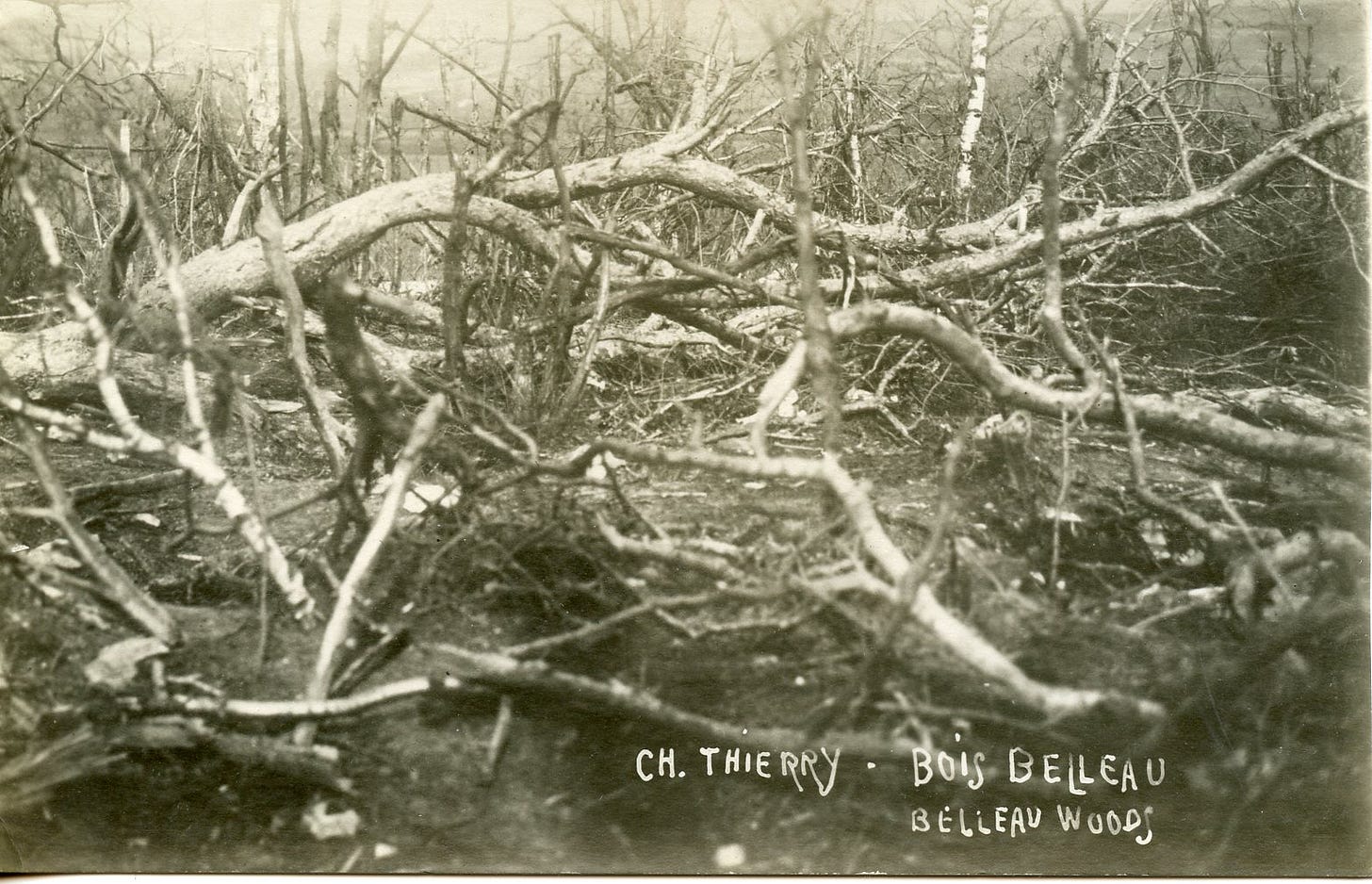The Battle of Belleau Wood and the 1918 Rose Bowl
We rightfully honor the men who landed on the coast of Normandy on June 6, 1944, but an equally brave group of men went on the attack twenty-six years earlier at Belleau Wood, one-hundred years ago today. Like D-Day in WWII, the attack by the U.S. Marines at Belleau Wood during WWI was the first in which American troops took the offensive in France and ultimately gained a substantive victory.
The Marines that fought at Belleau Wood included the 5th Marines, who were with the first set of American troops sent to France in June 1917. The 6th Marines fought at Belleau Wood as well and they began arriving in France in September 1917. After arriving in France, both units spent their time training or manning the trenches in a relatively quiet section of the front.
With Russia dropping from the war following its revolution, German troops transferred from the Eastern Front to the Western Front to participate in Germany’s Spring Offensive, which launched in March 1918. Germany had some success in Flanders and along the Somme River, but its greatest success came in late May and early June in the Aisne sector in Northeast France, where the Germans broke through the French lines and began their march toward Paris. American troops, who had seen limited action to that point, moved into the area to support the French and helped stop the German Army, only fifty miles from Paris.
The American Army’s 3rd Division took up defensive positions along the Marne at Château-Thierry and held, stopping the German attack. The Army’s 2nd Division, under which the 5th and 6th Marines served throughout the war, was positioned near an ancient royal hunting forest called Bois de Belleau or Belleau Wood which, at three hundred acres, was less than 40 percent the size of New York’s Central Park. Belleau Wood had not been logged like other French forests and was thick with tangled trees. It also had rocky outcrops which provided excellent defensive positions for the Germans who occupied the woods. The surrounding farm fields, much of it planted in wheat, provided little protection for anyone attacking the woods. The combination made Belleau Wood a wonderful defensive position to hold and a terrible position to attack.
The 5th and 6th Marines received orders to attack the village of Bouresches through Belleau Wood the morning of June 6. They attacked in waves across the open fields and were mowed down by machine gun fire. Rallying his men, 1st Sgt. Dan Daly cried, “Come on you sons of bitches! Do you want to live forever?” Inspired, the Marines entered the woods that morning and spent the next eighteen days fighting for its control. The Battle of Belleau Wood continued until June 26th, at which point all of Belleau Wood came under American control. By then, 1,062 Marines had been killed and 3,615 wounded; the combination represented nearly one-third of all Marines in France at the time. The Marine deaths in the battle also exceeded the total number of deaths suffered by the U.S.M.C. in its history to that point.
Among the Marines that fought at Belleau Wood was Cpl. Robert H. Wilson. Wilson was a junior at the University of Michigan when the U.S. declared war. At the end of the spring semester, he returned home to Los Angeles, enlisted in the Marines, and was sent to Mare Island for training. While there, Wilson played tackle on Mare Island’s football team early in the 1917 season. However, he transferred to Quantico before his teammates finished their undefeated season, were invited to, and beat the Army’s Camp Lewis in the 1918 Rose Bowl.
Wilson arrived in France in February 1918 with a replacement battalion and continued his training. As the Marines suffered casualties at Belleau Wood, Wilson joined the 84th Co., 6th Marines as a replacement halfway through the battle. Wilson survived Belleau Wood, but he did not survive the war. Within a month, Wilson went missing during the Battle of Soissons and was listed as missing in action until February 1919. Burial details located Wilson’s body at that time and he was posthumously awarded the French Croix de Guerre for conspicuous bravery in action.
Wilson was the first of the men connected to the 1918 Rose Bowl teams to die in action. The 1918 Rose Bowl teams included another player who was killed in action, two who died in training accidents while in the service, and two others who were wounded in action in WWI. Twelve others who played football for Mare Island or Camp Lewis -but were not on the rosters for the Rose Bowl game- were wounded in action as well.
Click here for options on how to support this site beyond a free subscription.




Can you tell me where you found this map of the battle?